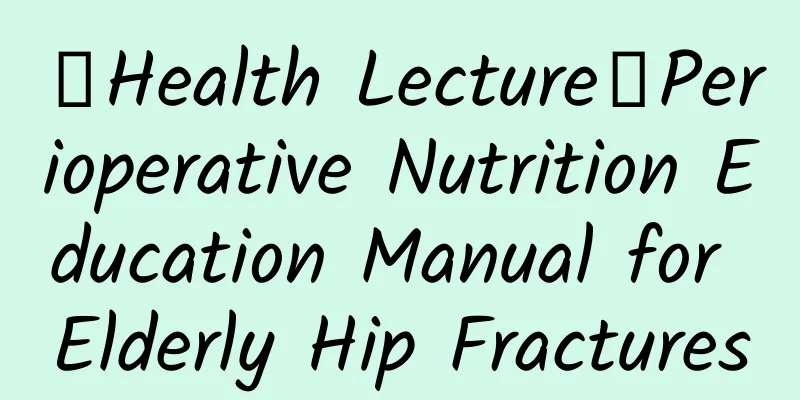【Health Lecture】Perioperative Nutrition Education Manual for Elderly Hip Fractures

|
In order to ensure the popularization effect of learning health knowledge in the 3rd China Senior Health Knowledge Competition, the organizer has collected various health science articles suitable for the elderly to learn from various hospitals. We will share them through the "Health Lecture Hall" column. Today, Wu Fang and Ye Yan from Tongren Hospital Affiliated to Shanghai Jiaotong University School of Medicine brought popular science content about perioperative nutrition of elderly hip fractures. Elderly friends are welcome to learn. When entering old age, the human body's muscle tissue begins to atrophy and the basal metabolism becomes lower, so the demand for energy is relatively reduced. However, the demand for most nutrients does not decrease. In general, when people get old, the amount of food changes from more to less, but the quality requirements do not decrease. With the aging of the population, hip fractures have become one of the common bone injuries in the elderly. Perioperative nutritional support is crucial for the rehabilitation of elderly patients with hip fractures. This article will briefly outline the nutritional education of elderly hip fractures during the perioperative period, mainly including the following aspects: Understanding Nutritional Needs Elderly patients with hip fractures need more protein, minerals, vitamins and trace elements to support the repair of bones and soft tissues. In addition, the elderly generally have reduced muscle mass and decreased muscle function, so they need to increase energy intake to maintain normal physiological functions of the body. Maintain water balance During the perioperative period, water intake needs to be increased to prevent dehydration and promote metabolism. It is recommended that the elderly drink at least 1500ml of water every day. At the same time, they should pay attention to the color of urine to avoid urinary tract infection. If the urine is dark yellow or the urine volume decreases, water should be replenished in time. Adequate protein intake Elderly patients with hip fractures need to take in an appropriate amount of protein to promote the repair of bones and soft tissues. Patients are advised to choose high-bio-value proteins such as fish, meat, eggs, and milk, with 1-1.5g per kilogram of body weight per day being appropriate. For elderly people with poor digestive function, medical foods or special medical formula foods can be appropriately selected to ensure protein intake. Calcium-rich foods Elderly patients with hip fractures should eat more calcium-rich foods, such as milk, yogurt, tofu, green leafy vegetables, etc., to promote fracture healing and prevent the risk of re-fracture. Vitamin D intake Vitamin D helps promote calcium absorption and utilization, and is important for fracture healing and bone health. Elderly people often have vitamin D deficiency, so it is recommended that elderly patients with hip fractures regularly test their vitamin D levels and supplement them appropriately under the guidance of a doctor. Foods rich in vitamin D include fish oil, animal liver, egg yolk, etc. Control salt intake Elderly patients with hip fractures should control their salt intake, preferably 5-6 grams per day, to reduce the risk of hypertension and cardiovascular disease. It is recommended to use low-salt condiments when cooking and reduce the intake of high-salt foods such as pickled foods and salted fish. Pay attention to dietary fiber intake Elderly people are prone to constipation, and dietary fiber helps soften stool and prevent constipation. Therefore, elderly patients with hip fractures should pay attention to consuming more dietary fiber and eat more fiber-rich vegetables, fruits, whole grains and other foods. Avoid overeating Elderly patients with hip fractures need to arrange their diet properly during the recovery period and avoid overeating. It is recommended to eat small and frequent meals to reduce the burden on the gastrointestinal tract and help maintain blood sugar stability. Check your nutritional status regularly Elderly patients with hip fractures need to have their nutritional status checked regularly during the perioperative period in order to promptly detect and resolve potential nutritional problems. Doctors can regularly test the patient's weight, serum albumin, prealbumin and other indicators to assess the patient's nutritional status and adjust the diet plan and drug treatment plan based on the assessment results. In summary, nutritional support plays a decisive role in the postoperative recovery of elderly patients with hip fractures during the perioperative period. Education on understanding nutritional needs, maintaining water balance, taking in an appropriate amount of nutrients such as protein and calcium, taking a reasonable amount of vitamin D, and controlling salt intake can help elderly patients with hip fractures better cope with perioperative nutritional challenges. At the same time, regular checks of nutritional status can help to promptly identify and resolve potential nutritional problems. Under the guidance of medical staff, a reasonable diet and lifestyle arrangement will help elderly patients with hip fractures recover faster. 【References】 [1] Chinese Nutrition Society. Dietary Guidelines for Chinese Residents, Beijing People's Medical Publishing House, 2022. [2] Su Rongbin, Wu Fei, Xu Jihao, et al. Nutritional risk screening and nutritional support treatment for elderly patients with hip fracture during perioperative period[J]. Chin J Orthop, 2020, 40(19): 1357-1364. [3] Zhang Minjie, Zhou Yewen. Effect of nutritional status on surgical prognosis of elderly patients with hip fractures[J]. Evidence-Based Nursing, 2021, 10(7): 1776-1780. About the first author: Wu Fang, a master's student, head nurse, member of the Popular Science and Health Education Working Committee of the Chinese Medical Education Association, has been engaged in clinical nursing for more than 20 years and is the head nurse of the Orthopedics Department of Shanghai Tongren Hospital. |
<<: Is liver cancer contagious? Or will it affect family members?
>>: Chinese medicine has a trick to relieve back and leg pain
Recommend
Is thread embedding better or intrauterine device better?
Contraception is the use of scientific methods to...
How to treat Yin deficiency and internal heat in girls?
Most of the symptoms of yin deficiency and intern...
What does high progesterone before transplantation mean?
IVF provides most women who have difficulty conce...
What should I do if the incision hurts two months after cesarean section?
With the continuous advancement of technology, mo...
Beware! Young lives are almost crushed by "high pressure", Changsha Fourth Hospital urgently reminds
Recently, Xiao Liu, a 20-year-old college student...
What happens if you eat spicy food after an abortion?
Many people think that abortion is a trivial matt...
What are the causes of female infertility?
According to the latest data, approximately 75% o...
How much does a glucose tolerance test cost?
During pregnancy, it is recommended that pregnant...
Sanfutie Gynecology
Every year during the dog days of summer, many pe...
Can hexamethylenetetramine solution be used by pregnant women?
Hexamine solution cannot be taken by pregnant wom...
The main reasons for aging in women
For female friends, maintaining a youthful and be...
What are the early signs of cervical cancer?
The early stage of cervical cancer is the key to ...
What are the early reactions of pregnant women
During the pregnancy process, there are usually s...
What are the drugs that increase estrogen in women?
If a female friend experiences a decrease in estr...









